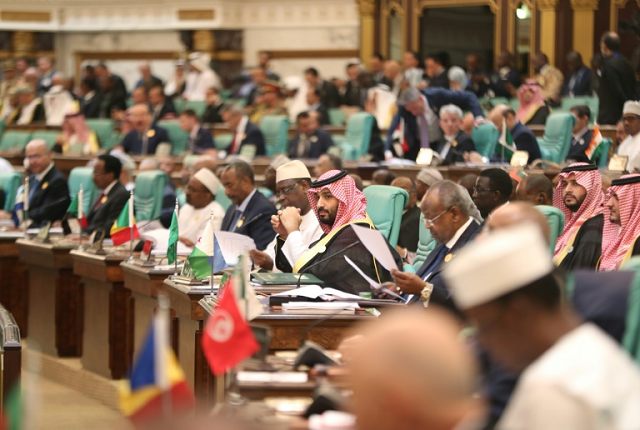Fifty years of OIC
At a time when the Muslim world is divided and in need of dire support, the OIC should be standing as a beacon of hope

PHOTO: AFP/FILE
In the half century of its existence, the organisation has connected with international apparatuses (including every specialised UN agency), governments, as well as civil society organisations (CSOs). The OIC’s activities also include long-term development projects including health, education, and agriculture.
The OIC’s promise in the field of conflict mediation in the Muslim world stems largely from its “cultural competence” and religious character. This proved an advantage in Somalia where assistance from an Islamic organisation was more acceptable to the al Shabab movement, allowing the OIC to open the way to other international donors. Iraq provides another success story where the OIC’s intervention in the sectarian violence following the bombing of the two holy shrines in the city of Samarra in 2006, was notably successful in bringing about social peace.
Unfortunately till now, the OIC has been long on idiom but short on action. Since its inauguration, the OIC summits have produced more than 3,200 resolutions ranging from the boycott of Israel to raising the level of economic, cultural and political cooperation among member countries. However, very few substantive resolutions have ever been implemented. Critics have highlighted the mistrust among the member states, lack of cohesion and unity, antagonistic foreign policies influenced largely by the Western world and territorial disputes as some reasons for the OIC’s lack of progress.
At a time when the Muslim world is divided and in need of dire support, the OIC should be standing as a beacon of hope for it, where Muslim countries can raise their concerns and have no fear of being derided and ridiculed. On the contrary, the organisation is slowly heading towards becoming an open bashing ground within OIC member states. An example is the 14th OIC Summit in 2019, where under the pretext of regional security issues member states openly vilified Iran.
Pakistan continues to enjoy a respectful status within the organisation. It is the only member with nuclear status and has one of the largest standing armies in the world. Islamabad has always been vocal on all OIC forums. Since the Kashmir issue captures the popular imagination of Muslim leaders globally, Pakistan has used this dynamic to pursue the Kashmir cause at this rostrum. Its success can be seen in that one of the sharpest reactions to New Delhi’s 2019 decision to revoke the special status of Jammu and Kashmir engendered from the OIC which reaffirmed the internationally recognised status of the Kashmir dispute.
The momentous changes that have swept across the Muslim world over the past decade alone demand that the OIC emerge as a torchbearer for defending the dignity and rights of Muslims. It is time that the governments of OIC member states realise their responsibilities towards each other and that they have many challenges in common. Needless to say that OIC’s efforts must not be limited to member states alone, but need to follow the basic principle that every Muslim is equally important. Keeping in view the rising Islamophobia as well as the rise of extremist ideologies such as Hindutva, the OIC needs to play a more proactive role to protect the rights of Muslim minorities around the world. By deepening the security cooperation, reforming its processes through capacity building and other means, as well as revising its mediation approach, the OIC will become better able to contribute to the resolution of seemingly intractable conflicts, especially in places where the Muslim community is involved.
Published in The Express Tribune, December 18th, 2019.
Like Opinion & Editorial on Facebook, follow @ETOpEd on Twitter to receive all updates on all our daily pieces.













COMMENTS
Comments are moderated and generally will be posted if they are on-topic and not abusive.
For more information, please see our Comments FAQ